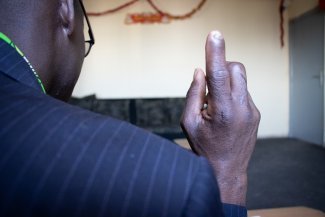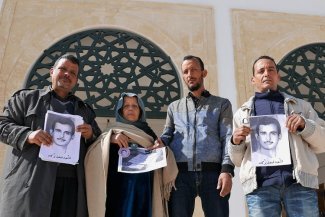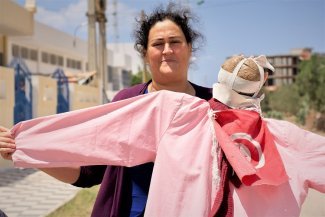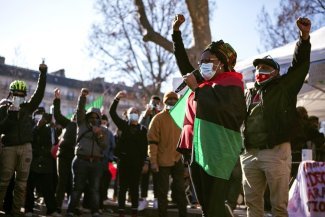Demonstrations against the Tunisian president Kais Saied last summer in the capital city, Tunis. Their banners remind us that “a people united” can never be defeated.
Just three years ago, Tunisia was celebrated as the only success story born out of the Arab Spring. However, beneath the glossy surface of its democratic institutions, growing unrest simmered over the failure to deliver on the promises of prosperity made during the 2011 revolution. Kais Saied, an independent politician with a reputation for integrity, was elected president in 2019 with more than 70 per cent of the vote. While some warned of the dangers of his brand of populism at the time, no one expected such a rapid and total descent into an autocracy with racist overtones.
Last February, Tunisian authorities arrested around 20 prominent figures, including opposition politicians from across the ideological spectrum, as well as businessmen and even Noureddine Boutar, director of the country’s most popular independent radio station. The main accusations levelled against them are ‘rebellion against the state’ and ‘terrorism’, despite the fact that no attacks have been recorded. Supposed evidence of their ‘conspiracies’ include meetings with the ambassadors of several European countries.
“The objective of all these arrests is to prevent the possibility of a return to democracy,” explains Kauther Ferjani, whose father, Saied Ferjani, a historic leader of the Islamist Ennahda party and a member of the dissolved parliament, was among those arrested in February. “In his case, there is no formal accusation. He was interrogated as a witness and then, we believe as a result of pressures on the judge, he was arrested while they look for a charge against him. [The police] interrogated and intimidated some of his friends, but they found nothing. This is an inversion of process in a state governed by the rule of law,” he adds.
Human rights organisations like Amnesty International and Human Rights Watch (HRW) have characterised these arrests as “arbitrary”. In public statements, Saied warned that judges who acquitted the defendants would be seen as “accomplices”.
The loss of judicial independence has been a concern in Tunisia since the president last year dissolved the Supreme Council of the Judiciary, the judges’ governing body, only to reinstate it with hand-picked magistrates. “These blows to judicial independence reflect the government’s determination to subjugate prosecutors and judges to the executive branch, at the expense of Tunisians’ right to a fair trial before independent and impartial judges,” says Salsabil Chellali, Tunisia director of HRW.
The dissidents arrested include two senior officials of the UGTT, the most powerful trade union in the Arab world. On 4 March 2023, the UGTT organised its first anti-government demonstration. Speaking at the demonstration, its secretary general Noureddine Taboubi insisted on the need for a “national dialogue” to address the current crisis. “Initially, the UGTT did not oppose Saied’s policies, but its antagonism has grown with every measure the president has taken. The government wants to weaken the union as much as possible, so I don’t see reconciliation in the near future,” says political scientist Aymen Boughanmi. Days before the protest, Esther Lynch, general secretary of the European Trade Union Confederation, was expelled from Tunisia. A few days later, a Spanish trade union official was barred from entering the country.
The end of Tunisia’s democratic experiment began in the summer of 2021, when Saied abruptly changed course during a conflict with the country’s prime minister. Employing a dubious, even fraudulent, reading of the constitution, he seized wide ranging powers, sacked the government and suspended parliament. Fed up with a deadlocked political class, a majority of Tunisians initially applauded what amounted to a ‘self-coup’.
But instead of enacting reforms to “end corruption,” Saied has been concentrating power in his own hands and undermining the independence of institutions that could act as a check on his designs, including the Independent High Electoral Body (ISIE).
Last summer, without consulting any political actors, Saied approved a new constitution. In December, he held legislative elections in which only 11 per cent of eligible voters went to the polls, a record low turnout. At the root of this growing popular disaffection are the same conditions that delegitimised Saied’s predecessors: an increasingly precarious economic situation, which now includes regular shortages of basic staples such as rice, flour and oil.
While Tunisia has been negotiating a rescue package with the International Monetary Fund to avoid default, Saied, fearing the unpopularity of the reforms it would require, has yet to give his approval. Both European foreign policy chief Josep Borrell and US Secretary of State Antony Blinken have warned of the danger of the country’s financial “collapse”.
Scapegoats rather than reforms or dialogue
Faced with this difficult situation, the president has resorted to a tired strategy used since time immemorial: finding a scapegoat to blame. To do so, he has adapted an idea held by the most radical fringe of the far-right in the West known as the ‘great replacement theory’, championed by, amongst others, former French presidential candidate Éric Zemmour. In a public speech, Saied claimed there was a “criminal plan” to “alter Tunisia’s demographic make-up” and replace its Arab and Muslim population with “hordes” of Black African migrants.
Though not supported by the facts – sub-Saharan Africans account for no more than 50,000 people out of Tunisia’s population of 12 million – the consequences of this claim have been very real. “In the days that followed, hundreds of sub-Saharan Africans were fired from their jobs and evicted from their homes, while others were attacked by mobs. The authorities launched a wave of arbitrary arrests of migrants, including many who are students and had their papers in order,” says a leader of the migrant community who has lived in Tunisia for more than a decade. In addition, detainees were not provided with food for several days, and some were forcibly shaved.
As a climate of panic took hold, the embassies of several African countries advised their nationals not to leave their homes. Four of them, Côte d’Ivoire, Burkina Faso, Guinea and Mali, have already organised several repatriation flights for their citizens in Tunisia. More than 2,600 Ivorians and 1,600 Guineans have registered with their embassies to be returned. Makeshift camps have been set up in front of these embassies for people evicted by their landlords, many of whom feared being subjected to a 1968 law that punishes with prison sentences anyone who assists irregular migrants.
In the days that followed, the Tunisian government took pains to qualify the president’s statements, claiming that they were aimed only at irregular migrants. However, the damage in the country, traditionally a hub for students from Francophone Africa and a centre for transnational health services, had already been done.
“It’s clear that the speech was racist because not all irregular migrants were mentioned, only Black sub-Saharan Africans. And they remain the only targets of police controls,” says the aforementioned leader of the sub-Saharan community, who also blames European authorities for “externalising” their borders and for their obsession with African immigration.
Despite such a bleak picture, the Tunisian opposition has not been able to mobilise large numbers of people in its anti-government demonstrations. “The opposition is weakened by its internal divisions over which measures to propose to combat the political crisis and, above all, the role of the Islamist party Ennahda, which some parties want to exclude from collective actions,” explains Boughanmi. Moreover, as he points out, the powerlessness of the opposition parties is due to the bad reputation they have among the public, who blame them for the failures of the transition. However, if the political and social crisis worsens, the opposition parties could gain traction in the streets and erode Saied’s remaining support.













